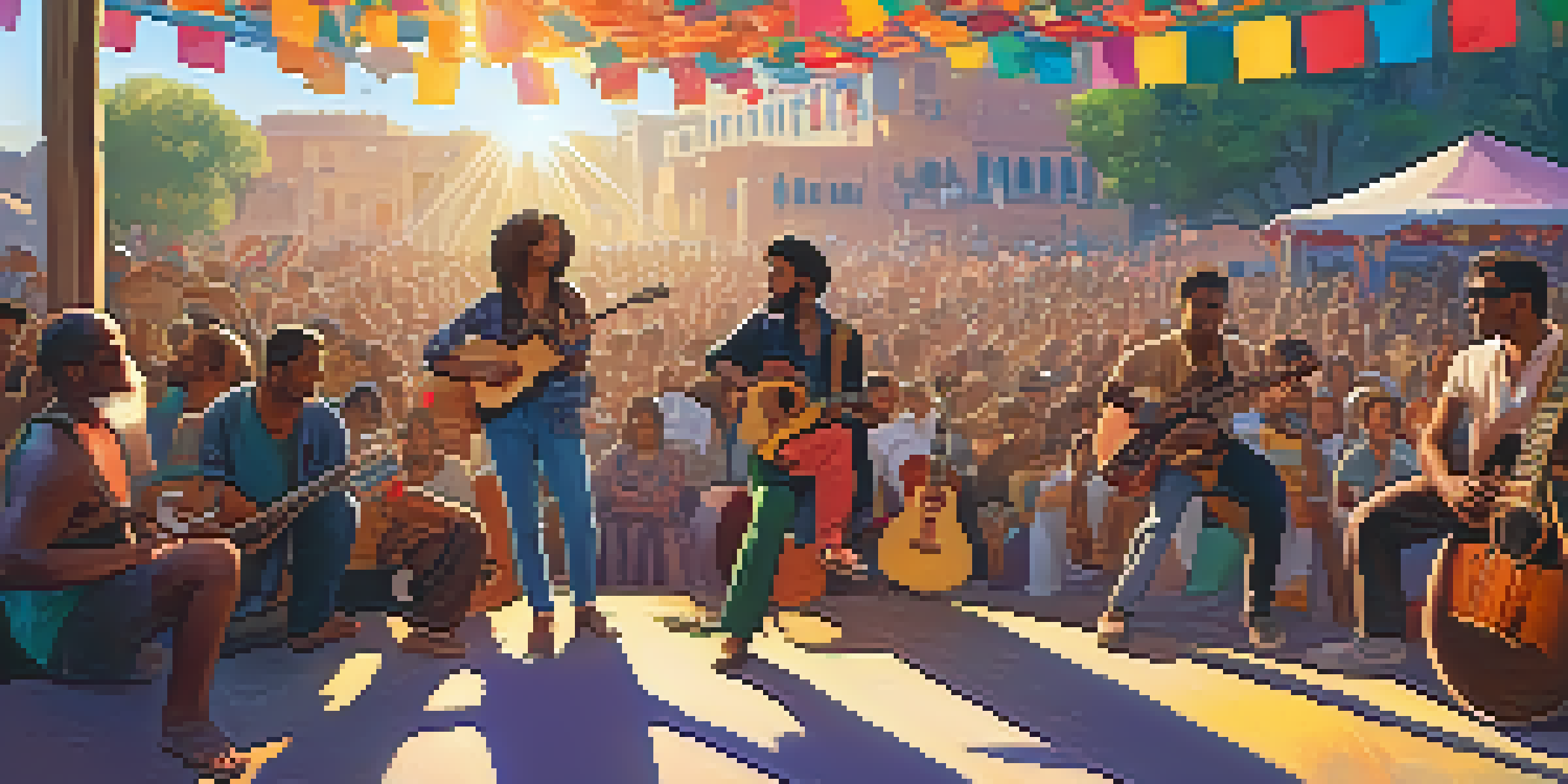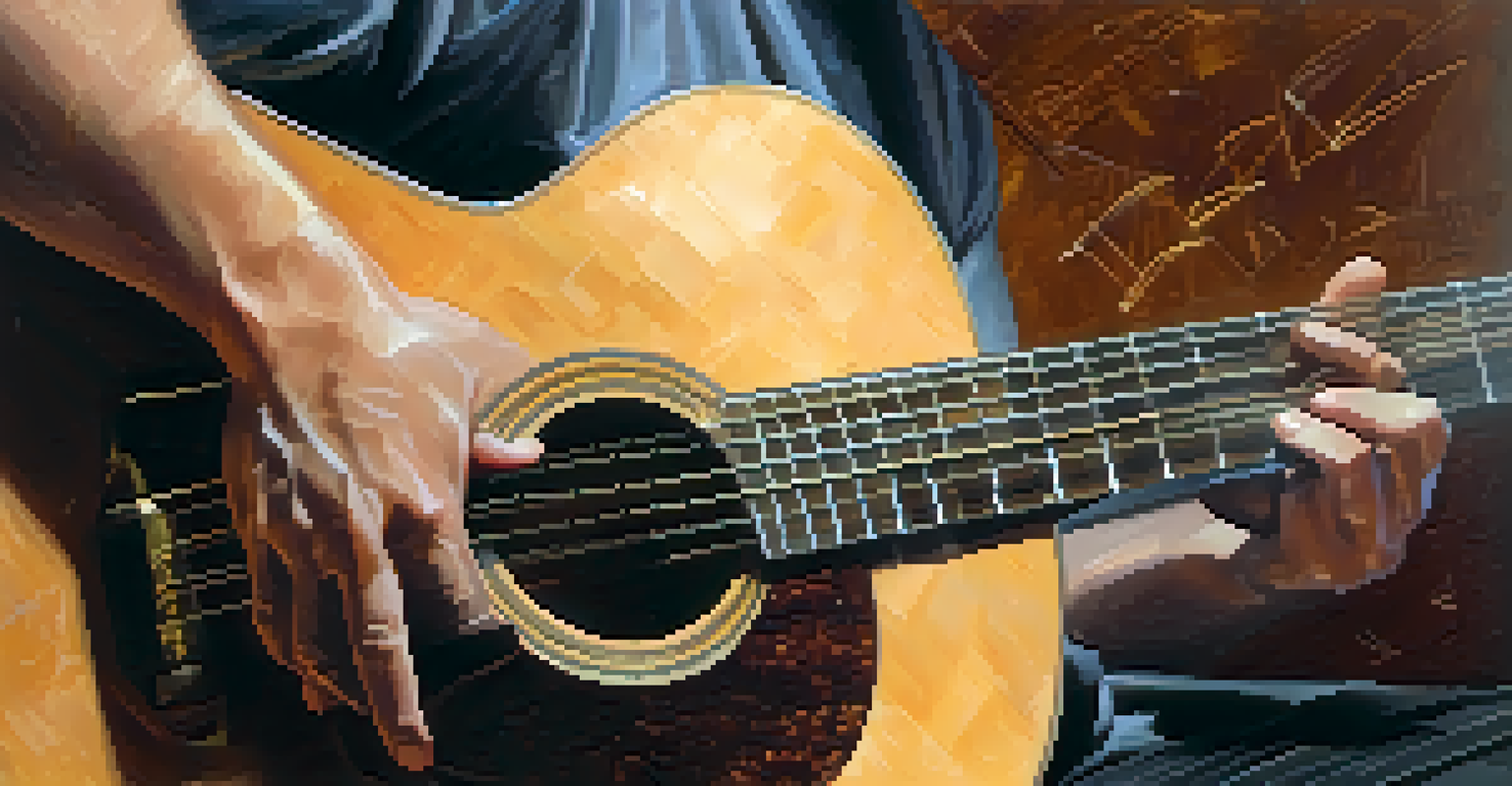Guitar as a Bridge: Connecting Cultures Through Music

The Guitar: A Versatile Instrument for All Cultures
The guitar is more than just an instrument; it's a cultural phenomenon that transcends borders. With its ability to adapt to various musical styles, it has become an integral part of many cultures around the globe. From the flamenco rhythms of Spain to the blues of the American South, the guitar speaks a universal language that everyone can understand.
Music is the universal language of mankind.
This versatility allows musicians from different backgrounds to collaborate and create something unique. For instance, a jazz guitarist might find common ground with a traditional Indian sitar player, blending styles to create a new sound. This fusion not only enriches the music but also fosters understanding and appreciation among diverse cultures.
Ultimately, the guitar serves as a bridge, connecting people through shared musical experiences. Whether strumming in a local café or jamming at a festival, guitarists are often brought together by their love for music, demonstrating how this instrument can unite us all.
Historical Roots: The Guitar's Journey Across Continents
The guitar has a rich history that reflects the movement of people and ideas across continents. Its origins can be traced back to ancient stringed instruments in various cultures, such as the lute in Europe and the oud in the Middle East. As explorers and traders traveled, they brought their music and instruments along, leading to the evolution of the guitar into the form we know today.

In the 19th century, the guitar gained popularity in the Americas, where it merged with other musical traditions. Influences from African rhythms, Spanish melodies, and indigenous sounds created a vibrant tapestry of styles like country, rock, and jazz. This historical journey illustrates how the guitar has been shaped by the cultures it has encountered.
Guitar: A Global Cultural Connector
The guitar transcends cultural boundaries, uniting musicians and audiences through diverse musical styles and shared experiences.
Today, the guitar is a symbol of cultural exchange, proving that music can bridge gaps between different communities. Each strum carries with it a piece of history, reminding us of the interconnectedness of our musical heritage.
Modern Collaborations: Guitarists from Different Cultures Unite
In today's globalized world, musicians are more connected than ever, thanks to technology and social media. Guitarists from various backgrounds collaborate online, creating a melting pot of musical styles. These modern collaborations often lead to innovative sounds that challenge traditional boundaries and highlight the versatility of the guitar.
The guitar is a miniature orchestra in itself.
For example, artists like Santana have successfully blended rock with Latin influences, showcasing how the guitar can adapt to different genres. Similarly, the rise of YouTube has allowed musicians worldwide to share their unique interpretations of popular songs, creating a dialogue between cultures through music.
These collaborations not only result in captivating music but also promote cultural understanding and appreciation. When we see musicians coming together, regardless of their origins, it sends a powerful message that music truly knows no boundaries.
The Emotional Power of Guitar Music Across Cultures
One of the most compelling aspects of guitar music is its emotional resonance, which transcends language and cultural differences. The sound of a guitar can evoke a wide range of emotions—joy, sorrow, nostalgia—allowing listeners to connect on a deeper level. This emotional power is a significant reason why the guitar is cherished in so many cultures.
Consider how a simple melody played on an acoustic guitar can transport you to a different time and place. For instance, a Spanish flamenco performance can ignite passion and energy, while a soft folk ballad can evoke memories of home and family. These emotional experiences create connections between people from diverse backgrounds, fostering empathy and understanding.
Emotional Resonance of Guitar Music
Guitar music evokes deep emotions, fostering connections and understanding among people from various backgrounds.
Ultimately, the guitar's ability to convey emotions serves as a reminder of our shared humanity. It encourages us to listen, learn, and appreciate the stories and experiences of others, regardless of where they come from.
Guitar Education: Bridging Cultural Gaps Through Learning
Learning the guitar has become a global phenomenon, with countless tutorials and online courses available. This accessibility allows people from various backgrounds to explore different musical styles and techniques, significantly broadening their cultural horizons. As individuals learn to play, they often discover the rich traditions behind the music they love.
For example, a student might start by learning classic rock riffs but eventually be inspired to delve into the intricate fingerpicking of Brazilian bossa nova. This journey not only enhances their skills but also fosters an appreciation for the diverse cultural roots of the music. By understanding the stories behind the songs, learners become ambassadors of cultural exchange.
Moreover, guitar education encourages collaboration among students from different backgrounds. Group lessons and workshops can create a sense of community, allowing participants to share their unique perspectives and experiences through music.
The Role of Guitar in Cultural Festivals Worldwide
Cultural festivals around the world often showcase the guitar as a central element of celebration and expression. These events bring together musicians from various backgrounds, highlighting the guitar's role as a unifying force in music. From the Newport Folk Festival in the U.S. to the Montreux Jazz Festival in Switzerland, guitarists come together to share their talents and learn from one another.
At these festivals, the atmosphere is electric, as diverse styles and sounds fill the air. Attendees experience a rich tapestry of music, from traditional folk to cutting-edge genres, all revolving around the guitar. This shared experience fosters a sense of belonging and community among participants and audiences alike.
Guitar Education Fosters Cultural Exchange
Learning the guitar opens doors to cultural appreciation and collaboration, enriching the musical journey for students worldwide.
Additionally, cultural festivals often serve as platforms for emerging artists, providing them with opportunities to showcase their talents. By giving a stage to diverse voices, these festivals contribute to the ongoing exchange of cultural ideas through music, ensuring that the guitar remains a vital part of the global musical landscape.
The Future of Guitar: Continuing Cultural Connections
As we look to the future, the guitar's role as a cultural connector remains strong. With advancements in technology, musicians can collaborate and share their work with audiences worldwide more easily than ever. This openness bodes well for the continued blending of musical styles and the growth of cultural understanding through the guitar.
Moreover, as new generations of musicians emerge, they bring fresh perspectives and innovations to the instrument. This evolution ensures that the guitar will continue to adapt and thrive, reflecting the diverse tapestry of human experience. The future of guitar music promises exciting possibilities for cultural exchange.

Ultimately, the guitar will continue to serve as a bridge, connecting people through the universal language of music. By embracing the stories, sounds, and traditions from various cultures, we can foster a deeper appreciation for the rich heritage that the guitar represents.